How to Take a Passport Photo with an Iphone
Learn how to take a passport photo with an iPhone

Tired of waiting in line at photo studios to get a passport picture taken? Not anymore. With nothing more than your iPhone, you can easily get a picture as per your needs. The best part? You don’t have to spend even a dollar more. Wondering if the picture quality will meet your official requirements? Don’t fret. All it takes is a few tweaks, and you get a professional passport picture that is ready for submission.
In this article, we are going to talk about how to take a passport photo with an Iphonein detail. Additionally, we’ll discuss how to edit your image to ensure it meets the passport photo requirements for various countries.
- Why Take a Passport Photo with an iPhone Instead of a Photo Studio
- Passport Photo Requirements For Various Countries
- iPhone passport photo tutorial: How to Prepare Before Taking a Photo with your iPhone?
- How to Take a Passport Photo on iPhone
- Step 1: Get in position
- Step 2: Use the iPhone gridlines to frame
- Step 3: Take multiple shots
- Step 4: Check your expression and posture
- Step 5: Review for clarity and rules
- How to Edit Your Passport Image With X-Design?
- Tips to Consider While Clicking Passport-Size Photo on iPhone
- 1. Keep your face relaxed
- 2. Watch your hair and forehead
- 3. Avoid shadows under the chin
- 4. Clean the lens before clicking
- 5. Don’t crop too early
- 6. Double-check clothing contrast
- Common use cases for passport photos
- Final Words
Why Take a Passport Photo with an iPhone Instead of a Photo Studio
Going to a studio just for a passport picture feels like an old habit that doesn’t always make sense anymore. If you already have an iPhone in your pocket, you’ve got everything you need to get a photo that works. Here’s why more people are skipping the studio:
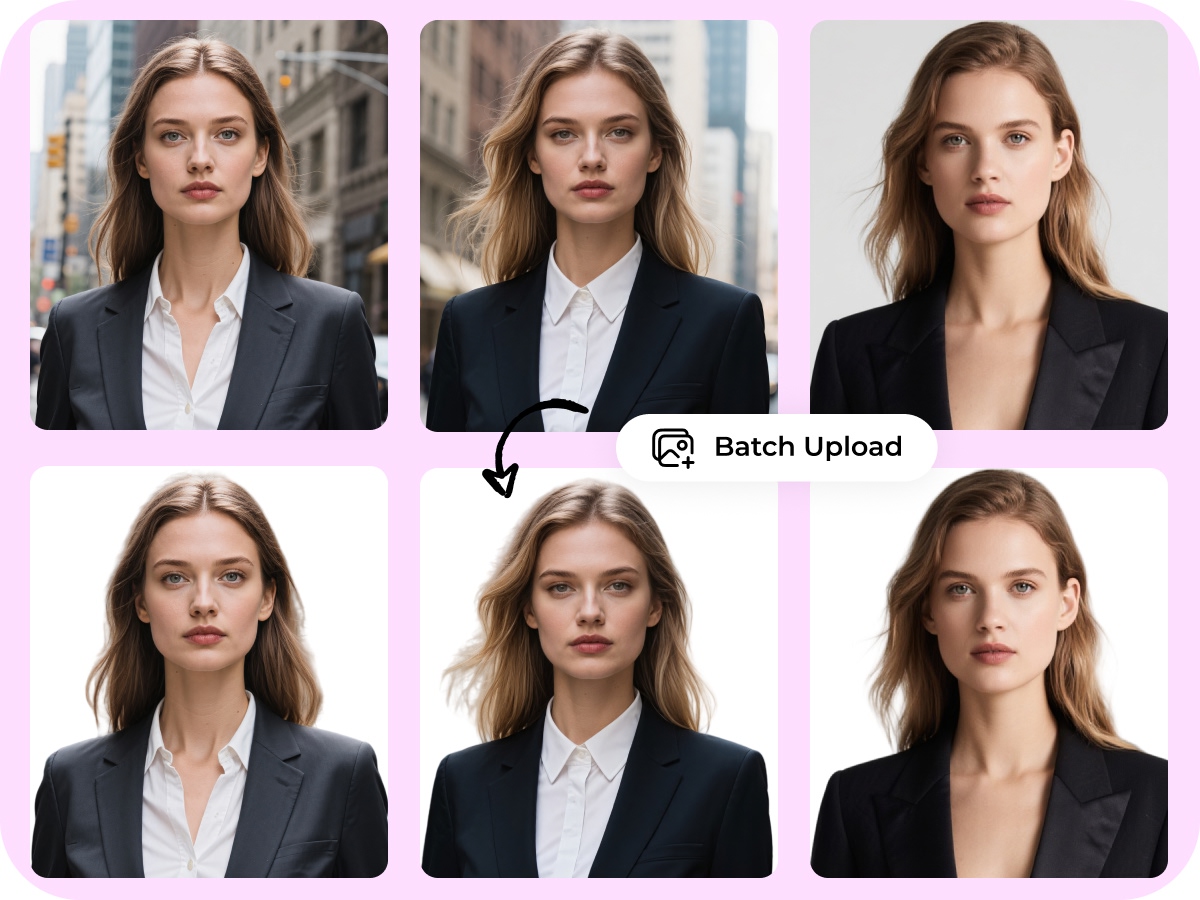
Saves money
Passport photo studios usually charge for every single picture. And if you don’t like the first shot, you end up paying again. Using your iPhone costs nothing. Here, you can take as many photos as you need.
Full control over the result
In a studio, you get whatever the photographer captures. At home, you’re in charge. You can adjust the lighting, retake the picture until you’re happy. Make small edits right on your phone before sending it off.
Convenience whenever you need it
Studios run on their own schedules, but your iPhone is always with you. If you suddenly need a passport image for a renewal, a visa, or even an unexpected application, you don’t have to wait for an appointment. You can get it done on your own time.
Passport Photo Requirements For Various Countries
Country | Size (inches) | Background | Face Position | Expression |
United States | 2 × 2 | Plain white or off-white | Head must be 1–1 3/8 inches from chin to top | Neutral, both eyes open |
United Kingdom | 35 × 45 mm | Plain light grey or cream | Head size 29–34 mm | Neutral, mouth closed |
Canada | 50 × 70 mm | Plain white | Face centered, head size 31–36 mm | Neutral, no smile |
India | 35 × 45 mm | Plain white | Face must cover 70–80% of the photo | Neutral, eyes open |
Australia | 35–40 × 45–50 mm | Plain white or light grey | Head size 32–36 mm | Neutral, no teeth visible |
China | 33 × 48 mm | Plain white or light blue | Face should cover 70–80% of the photo | Neutral, no smile, mouth closed |
iPhone passport photo tutorial: How to Prepare Before Taking a Photo with your iPhone?
Understand that small mistakes in lighting and outfits can lead to rejection. Here are the key things to prepare:
Item / Setup | Why You Need It |
iPhone (rear camera) | Gives higher resolution and sharper details than the front camera. |
Tripod or stable surface | Keeps the phone steady and level, especially if you’re taking the photo alone. |
Plain wall or background | Ensures a clean backdrop that meets passport requirements. |
Light source | Provides even lighting so your face is clear without shadows. |
Neutral, dark clothing | Helps you stand out against the background and avoids blending in. |
How to Take a Passport Photo on iPhone
Now that we have everything set up, it’s time to start clicking your pictures. Here are some steps to follow:
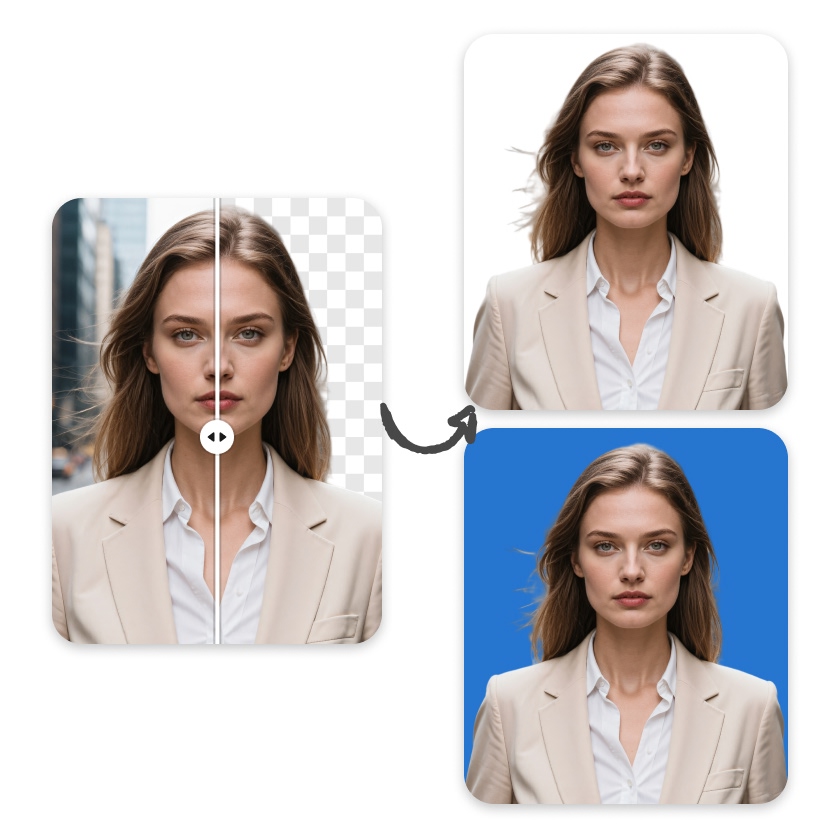
Step 1: Get in position
First things first, stand or sit in front of a plain wall. Leave about an arm’s length of space between you and the wall to avoid shadows. Also, look straight into the camera.
Step 2: Use the iPhone gridlines to frame
In the next step, turn on the grid in your iPhone camera settings. The lines will help you keep your head in the middle and your shoulders straight. Your eyes should be about 1/3 up the frame, with your head and shoulders visible.
Step 3: Take multiple shots
Now, it's time to click the picture. Don’t just take one and be done. Use the timer if you’re taking it alone or ask someone to click for you. Take a few shots; sometimes the smallest detail, like a blink or head tilt, can ruin it. This gives you flexibility, especially if you prefer to take a passport picture at home on iPhone without stressing about getting it perfect in one try.
Step 4: Check your expression and posture
Go through the photos and make sure you’re not smiling big, not frowning and your mouth is closed. Also, check that your head is straight and your shoulders are even.
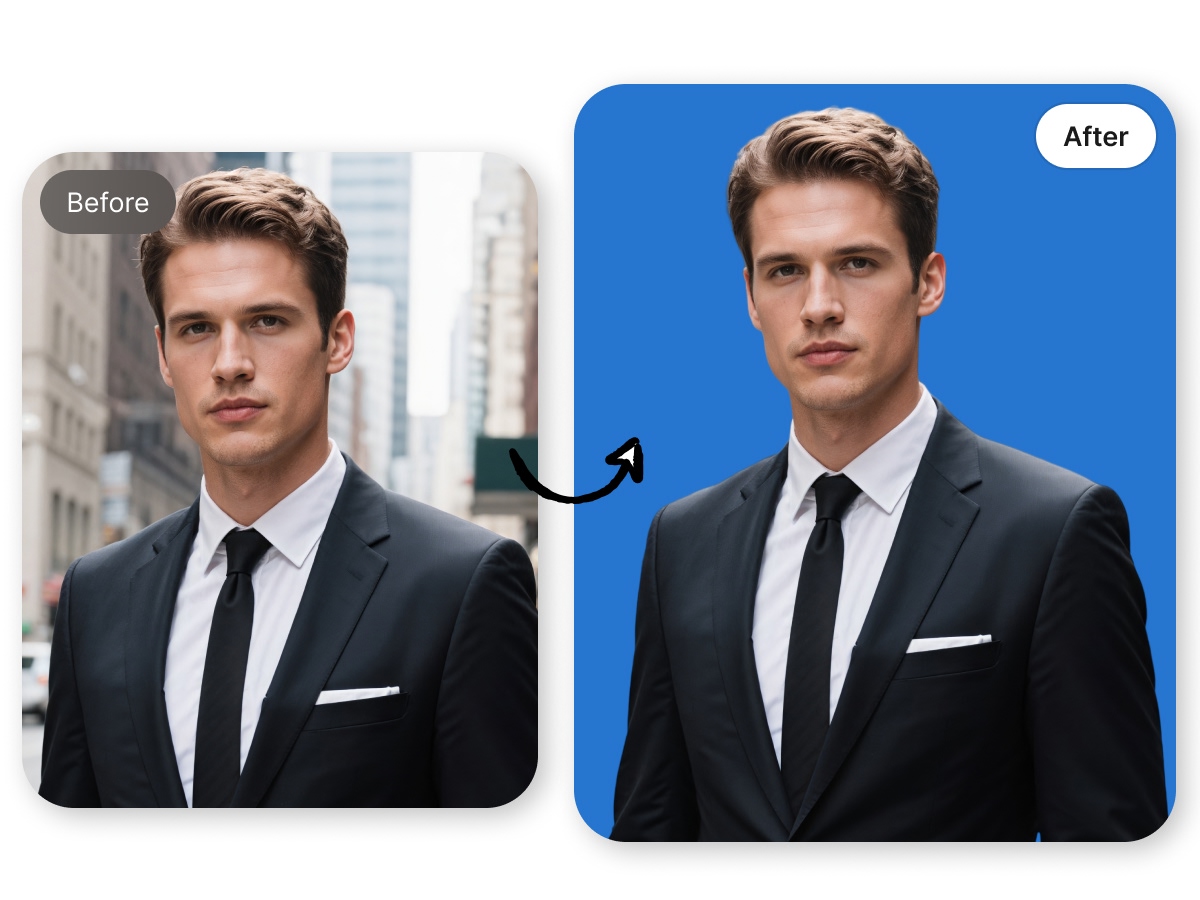
Step 5: Review for clarity and rules
Zoom in on the photo to see if it’s sharp. Both eyes should be visible and nothing (hair or glasses glare) should be in front of your face. Compare your photo with your country’s passport requirements. It's suggested to check for the background color. Moreover, look for the head size in your image. If something’s off, retake the image now.
How to Edit Your Passport Image With X-Design?
Okay, so you've got your photo – great! Now, let's get it ready to meet all the official requirements. The easiest editing route is to use a web-based tool. The reason? It saves you from downloading heavy apps and lets you adjust the background and crop in just a few clicks. The best app for passport photo iPhone is X-Design. It’s built to handle quick edits and background changes without any fuss.
Upload your image
Open X-Design ID photo maker tool and upload the photo you just took. The tool will automatically remove the background for you.
Choose a solid background
Go to the background options and select a plain color—white is the safest choice for passport photos, but you can also pick light gray if required by your country.
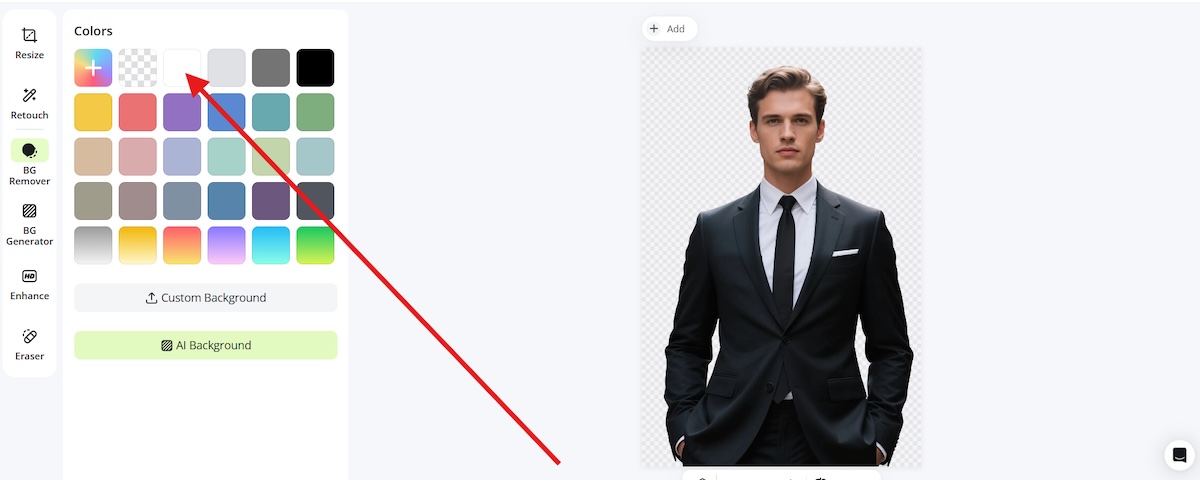
Resize to the right dimensions
Head over to the resize option. Choose the preset aspect ratio for passport photos, or enter a custom size based on your country’s rules.
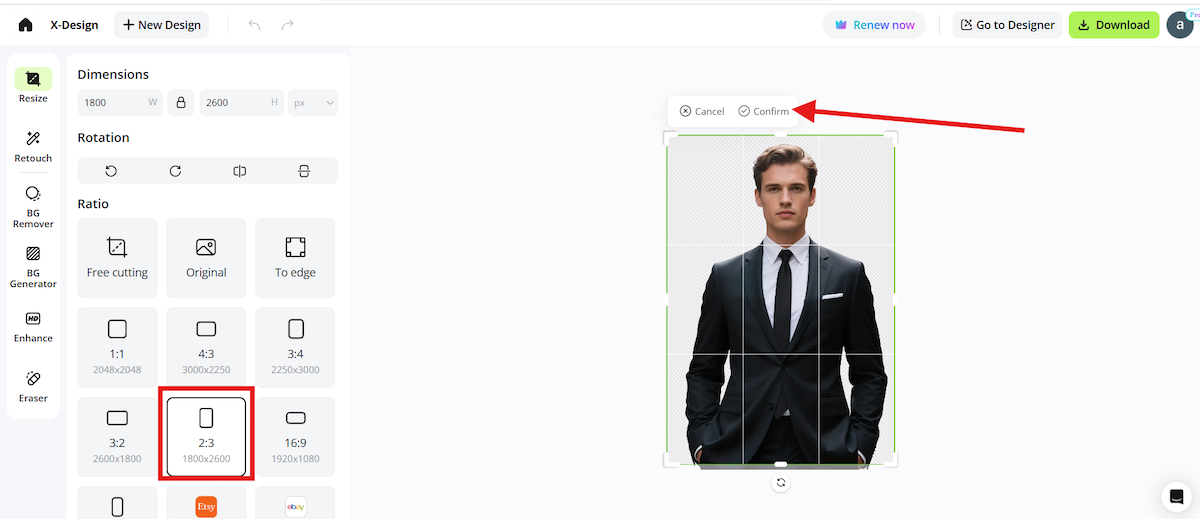
Fix image quality if needed
If zooming in makes the photo look blurry, use the “Enhance” feature to sharpen details. This will bring clarity back.
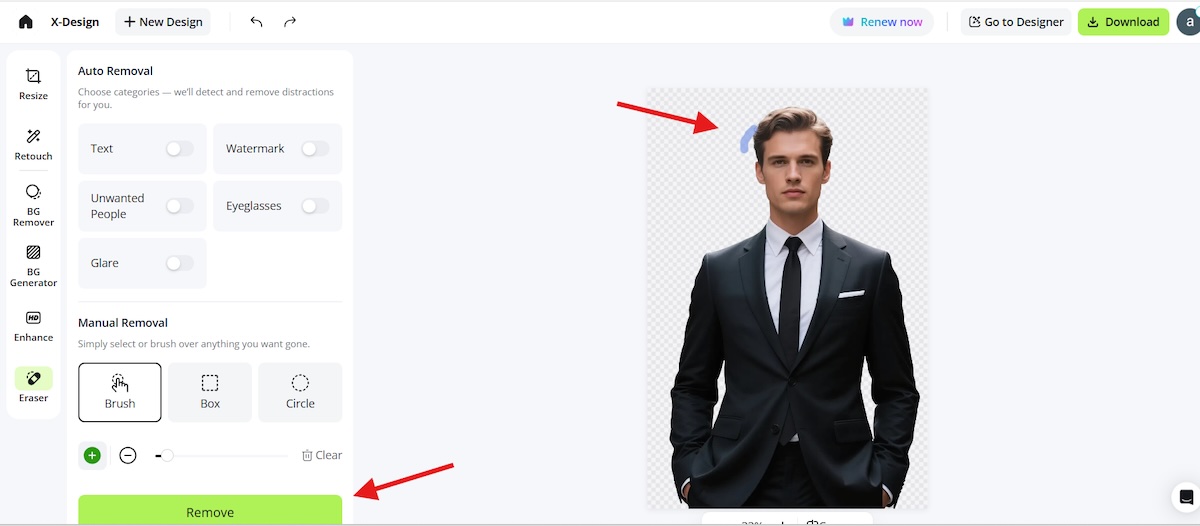
Refine the edges
Use the eraser tool to clean up small details around hair or shoulders so the cutout looks natural and neat.
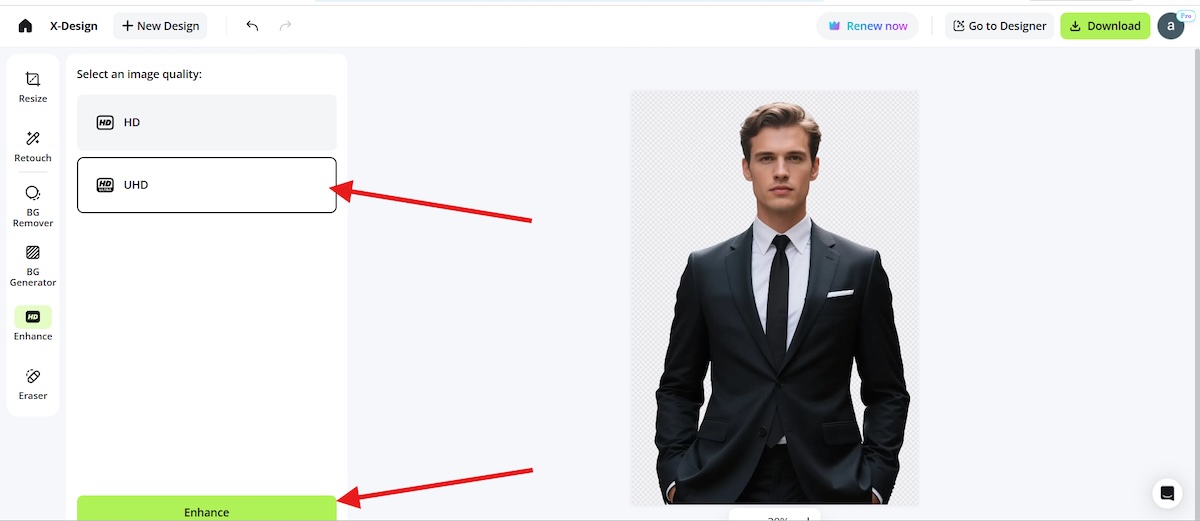
Center the Image and add White Background
Make sure your face is centered in the frame. After that select the white background option from the BG remover.
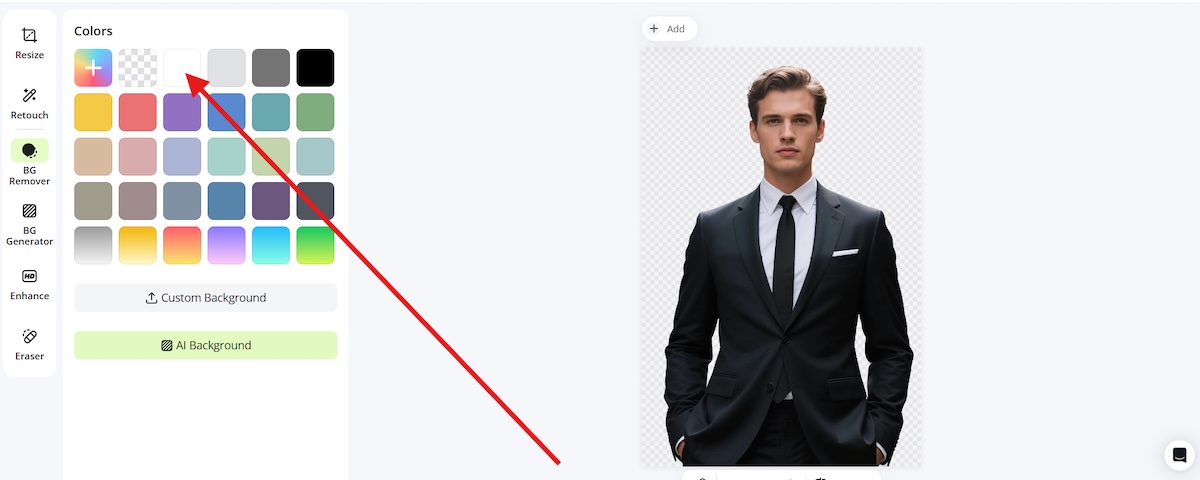
Download the image
Once everything is done, simply hit to the download button. Then save the final image. You’ll now have a passport photo that can be used.
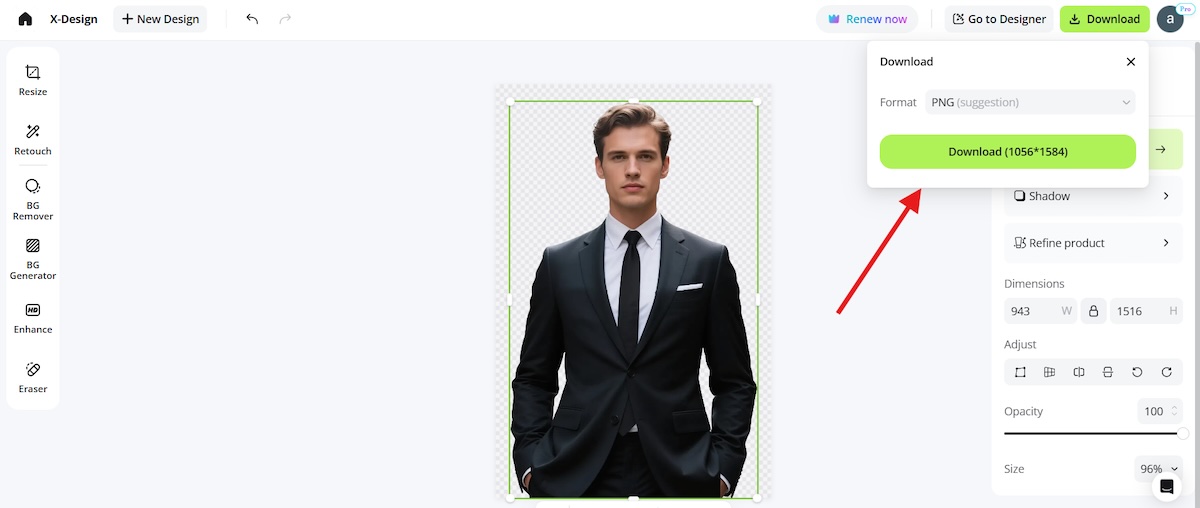
And that’s how you can edit a passport photo on iPhone.
Tips to Consider While Clicking Passport-Size Photo on iPhone
Getting the basics right is only half the job. A passport photo can still be rejected if small details are missed. Here are some extra tips that go beyond setup and make sure your photo doesn’t cause trouble later:
1. Keep your face relaxed
It’s tempting to smile or pose, but official guidelines usually call for a calm, neutral look. Try practicing a natural expression in front of the mirror before you click, so it doesn’t look forced.
2. Watch your hair and forehead
Many photos are rejected simply because hair is covering part of the face. Tie back loose strands. Plus, make sure your full forehead and eyebrows are visible. It’s always suggested to refer to a passport photo iPhone guide.
3. Avoid shadows under the chin
Even if the wall looks evenly lit, subtle shadows can appear on your neck. A quick fix is to slightly adjust your head angle until the light falls evenly.
4. Clean the lens before clicking
This sounds obvious, but fingerprints or dust on the iPhone lens can blur the image. A soft cloth wipe makes a big difference in clarity.
5. Don’t crop too early
When clicking, give yourself extra space around the head and shoulders. Cropping too close while taking the photo may leave no room for adjustments during editing.
6. Double-check clothing contrast
Some dark clothes blend into the background after editing, and light clothes can look washed out. Pick a mid-tone shirt that gives your face more focus.
These small adjustments often decide whether your photo gets accepted the first time. Or ends up being rejected. A little attention here saves you the hassle of redoing everything later.
Common use cases for passport photos
Use Case | Purpose |
Passport Application & Renewal | Required for new passports or renewing existing ones. |
Visa Applications | Essential for travel visas to most countries. |
Government ID Cards | Used for national IDs, driving licenses, or residency permits. |
Job Applications Abroad | Sometimes needed for work permits or professional documents. |
Academic or Exam Registrations | Required by some universities and competitive exams. |
Final Words
So that’s it for how to take a passport photo with an iPhone. Following these steps, you can get perfect shots for an embassy or even other basic documents. To get the best results, it’s always suggested to stick to these best practices before you submit your image. And once your photo is ready, refine it with X-Design. The bonus? You’ll always have a digital copy saved on your phone. Which means you can complete your future applications much faster. So, what are you waiting for? Try X-Design to get your perfect passport photo in minutes!
Related articles

4 Ways To Remove Backgrounds from Photos

Gemini Images Too Blurry? Here’s How to Make Them Crystal Clear in Seconds

How to Remove White Background from Images

